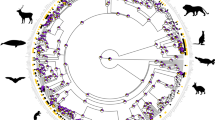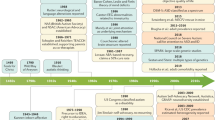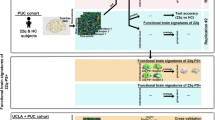Abstract
Nonhuman primates offer unique opportunities to study the effects of genes, environments, and their interaction, on physiology and complex behavior. We examined genotype and early environment contributions to CNS function in a large sample of rhesus monkeys. In humans, length variation of the serotonin (5-HT) transporter (5-HTT) gene-linked polymorphic region (5-HTTLPR) that results in allelic variation in 5-HTT expression is associated with decreased serotonergic function and 5-HT-mediated psychopathology. We report that an analogous variation of the gene's regulatory region in monkeys interacts with early experience to affect central 5-HT functioning. Monkeys with deleterious early rearing experiences were differentiated by genotype in cerebrospinal fluid concentrations of the 5-HT metabolite, 5-hydroxyindoleacetic acid, while monkeys reared normally were not. These findings demonstrate an environment-dependent effect of the rh5-HTTLPR genotype on CNS 5-HT function and suggest nonhuman primates may provide an important avenue for investigating gene/environment interactions using candidate genes for physiological and behavioral traits.
This is a preview of subscription content, access via your institution
Access options
Subscribe to this journal
Receive 12 print issues and online access
$259.00 per year
only $21.58 per issue
Buy this article
- Purchase on Springer Link
- Instant access to full article PDF
Prices may be subject to local taxes which are calculated during checkout


Similar content being viewed by others
Notes
Although there were too few subjects with the s/s and xl/l genotypes for inclusion in the statistical analysis, their data are reported for reference purposes. The z-scores for CSF 5HIAA concentrations for these individuals were: s/s (n = 2) = −0.387, −0.466; xl/l (n = 1) = −0.387.
References
Lesch KP et al. Association of anxiety-related traits with a polymorphism in the serotonin transporter gene regulatory region Science 1996 274: 1527–1531
Veenstra-VanderWeele J, Anderson GM, Cook EH . Pharmacogenetics and the serotonin system: initial studies and future directions Eur J Pharm 2000 410: 165–181
Auerbach J et al. Dopamine D4 receptor (D4DR) and serotonin transporter promoter (5-HTTLPR) polymorphisms in the determination of temperament in 2-month-old infants Mol Psychiatry 1999 4: 369–373
Greenberg B et al. Association between the serotonin transporter promoter polymorphism and personality traits in a primarily female population sample Am J Med Genet 2000 96: 202–216
Osher Y, Hamer D, Benjamin J . Association and linkage of anxiety-related traits with a functional polymorphism of the serotonin transporter gene regulatory region in Israeli sibling pairs Mol Psychiatry 2000 5: 216–219
Ricketts M, Hamer R, Sage J, Manowitz P, Fend F, Menza M . Association of a serotonin transporter gene promoter polymorphism with harm avoidance in an elderly population Psychiatr Genet 1998 8: 41–44
Ebstein R, Gritsenko I, Nemanov L, Frisch A, Osher Y, Belmaker R . No association between the serotonin transporter gene regulatory region polymorphism and the Tridimensional Personality Questionnaire (TPQ) temperament of harm avoidance Mol Psychiatry 1997 2: 224–226
Gelernter J, Kranzler H, Coccaro E, Siever LJ, New AS . Serotonin transporter protein gene polymorphism and personality measures in African American and European American subjects Am J Psychiatry 1998 155: 1332–1338
Gustavsson JP et al. No association between serotonin transporter gene polymorphisms and personality traits Am J Med Genet 1999 88: 430–436
Herbst JH, Zonderman AB, McCrae RR, Costa PT . Do the dimensions of the temperament and character inventory map a simple genetic architecture? Evidence from molecular genetics and factor analysis Am J Psychiatry 2000 157: 1285–1290
Jorm AF, Prior M, Sanson A, Smart D, Zhang Y, Easteal S . Association of a functional polymorphism of the serotonin transporter gene with anxiety-related temperament and behavior problems in children: a longitudinal study from infancy to the mid-teens Mol Psychiatry 2000 5: 542–547
Kumakiri C et al. Study of the association between the serotonin transporter gene regulatory region polymorphism and personality traits in a Japanese population Neurosci Lett 1999 263: 205–207
Mazzanti CM et al. Role of the serotonin transporter promoter polymorphism in anxiety-related traits Arch Gen Psychiatry 1998 55: 936–940
Furlong RA et al. Analysis and meta-analysis of two serotonin transporter gene polymorphisms in bipolar and unipolar affective disorders Am J Med Genet 1998 81: 58–63
Harlow HF, Harlow MK . The affectional systems. In: Schrier AM, Harlow HF, Stollinitz F (eds) Behavior of Nonhuman Primates Academic Press: New York 1965 pp 287–334
Suomi SJ . Genetic and maternal contributions to individual differences in rhesus monkey biobehavioral development. In: Krasnegor NA, Blass EM, Hofer MA, Smotherman WP (eds) Perinatal Development: A Psychobiological Perspective Academic Press: New York 1987 pp 397–420
Kraemer GW . Effects of differences in early social experience on primate neurobiological-behavioral development. In: Reite M, Field T (eds) The Psychobiology of Attachment Academic Press: New York 1985 pp 135–161
Lesch KP et al. The 5-HT transporter gene-linked polymorphic region (5-HTTLPR) in an evolutionary perspective: alternative biallelic variation in rhesus monkeys J Neural Transm 1997 104: 1259–1266
Heinz A et al. In vivo association between alcohol intoxication, aggression, and serotonin transporter availability in nonhuman primates Am J Psychiatry 1998 155: 1023–1028
Little KY et al. Cocaine, ethanol, and genotype effects on human midbrain serotonin transporter binding sites and mRNA levels Am J Psychiatry 1998 155: 201–213
Heils A et al. Allelic variation of human serotonin transporter gene expression J Neurochem 1996 66: 2621–2624
Greenberg BD, Tolliver TJ, Huang SJ, Li Q, Bengel D, Murphy D . Genetic variation in the serotonin transporter promoter region affects serotonin uptake in human blood platelets Am J Med Genet 1999 88: 83–87
Nielsen DA, Mazzanti CM, Linnoila M, Goldman D . Serotonin transporter and seasonal variation in serotonin function Neuropsychopharmacology 1999 20: 507–508
Hanna GL et al. Serotonin transporter and seasonal variation in blood serotonin in families with obsessive-compulsive disorder Neuropsychopharmacology 1998 18: 102–111
Naylor L, Dean B, Pereira A, Mackinnon A, Kouzmenko A, Copolov D . No association between the serotonin transporter-linked promoter region polymorphism and either schizophrenia or density of the serotonin transporter in human hippocampus Mol Med 1998 4: 671–674
Jonsson EG et al. Polymorphisms in the dopamine, serotonin, and norepinephrine transporter genes and their relationships to monoamine metabolite concentrations in CSF of healthy volunteers Psychiatry Res 1998 79: 1–9
Nobile M et al. Effects of serotonin transporter promoter genotype on platelet serotonin transporter functionality in depressed children and adolescents J Am Acad Child Adolesc Psychiatry 1999 38: 1396–1402
Kraemer GW, Ebert MH, Schmidt DE, McKinney WT . A longitudinal study of the effect of different social rearing conditions on cerebrospinal fluid norepinephrine and biogenic amine metabolites in rhesus monkeys Neuropsychopharmacology 1998 2: 175–189
Higley JD, Suomi SJ, Linnoila M . A longitudinal assessment of CSF monoamine metabolite and plasma cortisol concentrations in young rhesus monkeys Biol Psychiatry 1992 32: 127–145
Higley JD, Suomi SJ, Linnoila M . CSF monoamine metabolite concentrations vary according to age, rearing, and sex, and are influenced by the stressor of social separation in rhesus monkeys Psychopharmacology 1991 103: 551–556
Coplan JD et al. Cerebrospinal fluid concentrations of somatostatin and biogenic amines in grown primates reared by mothers exposed to manipulated foraging conditions Arch Gen Psychiatry 1998 55: 473–477
Shannon C, Champoux M, Suomi SJ . Rearing condition and plasma cortisol in rhesus monkey infants Am J Primatology 1998 46: 311–321
Higley JD et al. Paternal and maternal genetic and environmental contributions to cerebrospinal fluid monoamine metabolites in rhesus monkeys (Macaca mulatta) Arch Gen Psychiatry 1993 50: 615–623
Higley JD, King ST, Hasert MF, Champoux M, Suomi SJ, Linnoila M . Stability of interindividual differences in serotonin function and its relationship to severe aggression and competent social behavior in rhesus macaque females Neuropsychopharmacology 1996 14: 67–76
Scheinin M, Chang WH, Kirk KL, Linnoila M . Simultaneous determination of 3-methoxy-4-hydroxyphenylglycol, 5-hydroxyindoleacetic acid, and homovanillic acid in cerebrospinal fluid with high-performance liquid chromatography using electrochemical detection Analyt Biochem 1983 131: 246–253
Polinsky RJ, Brown RT, Burns RS, Harvey-White J, Kopin IJ . Low lumbar CSF levels of homovanillic acid and 5-hydroxyindoleacetic acid in multiple system atrophy with autonomic failure J Neurol Neurosurg Psychiatry 1988 51: 914–919
Goldman D, Urbanek M, Guenther D, Robin R, Long JC . The dopamine D2 receptor: linkage and association of a functional allele [Ser311Cys] and other D2DR markers to alcoholism, substance abuse, and schizophrenia in Southwestern American Indians Am J Med Genet (Neuropsychiatr Genet) 1997 74: 386–394
Long JC et al. Evidence for genetic linkage to alcohol dependence on chromosomes 4 and 11 from an autosome-wide scan in an American Indian population Am J Med Genet (Neuropsychiatr Genet) 1998 81: 216–221
Kittles RA et al. Cladistic analysis of Y chromosome effects on alcoholism and related personality traits Proc Natl Acad Sci USA 1999 96: 204–299
Acknowledgements
We thank W Airoso, A Dodson, G Flory, S Higley, A Hurley, T King, S Lindell, C Shannon, PJ Pierre, J Pushkas, T Tsai and K Zajicek for assistance. Supported by the National Institutes of Health, USA, the European Commission (BMH4-CT96–0730), and the BMBF of Germany. KPL is supported by the Hermann and Lilly Schilling Foundation. We are grateful to Dr David Goldman, S Graham and L Akhtar for support of the DNA extraction and sample collection.
Author information
Authors and Affiliations
Corresponding author
Rights and permissions
About this article
Cite this article
Bennett, A., Lesch, K., Heils, A. et al. Early experience and serotonin transporter gene variation interact to influence primate CNS function. Mol Psychiatry 7, 118–122 (2002). https://doi.org/10.1038/sj.mp.4000949
Received:
Revised:
Accepted:
Published:
Issue Date:
DOI: https://doi.org/10.1038/sj.mp.4000949
Keywords
This article is cited by
-
A nonhuman primate model of human non-suicidal self-injury: serotonin-transporter genotype-mediated typologies
Neuropsychopharmacology (2022)
-
Early life adversity shapes neural circuit function during sensitive postnatal developmental periods
Translational Psychiatry (2022)
-
Entomological impact of mass administration of ivermectin and dihydroartemisinin-piperaquine in The Gambia: a cluster-randomized controlled trial
Parasites & Vectors (2022)
-
Photoperiodic effects on monoamine signaling and gene expression throughout development in the serotonin and dopamine systems
Scientific Reports (2020)



